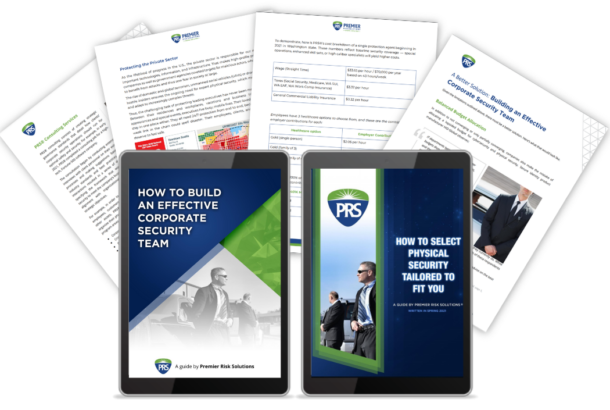The CEO, Denial, and Executive Protection
Nature’s Gift
In terms of survival, nature gave us a great gift: our intuition or “gut instinct”. We all can relate to having that innate feeling that something was not quite right. Whether it was the hair on the back of our neck standing on end or that funny feeling in the pit of our stomach, we felt that danger was close-by. Our instinct and senses told us so. People who find themselves in this situation know they only have four options at their disposal depending on the circumstances – freeze (to do nothing), run, hide, or fight. From my perspective, it is the first that causes the greatest risk, yet this is what happens much of the time.

Denial and Rationalization
Author John Leach shares, “Many witnesses attest that victims of a disaster often perish despite reasonable possibilities for escaping because their behavior during the initial moments of the accident was inappropriate to the situation. Frequently witnesses report victims ‘freezing’ in the face of danger.” So, why do people often fail to react to threats by foregoing their intuition? The answer to this question can be found in nature’s second gift; one that often overpowers intuition: Denial! Denial can be an all-powerful force often overriding intuition. Denial can lead us to believe we are safe when we are not. To complicate things more, denial has a strong ally, and it’s called rationalization. Denial provides the seeds for incorrectly and unsafely assessing the situation one finds themselves in and rationalization offers the fertilizer and water for a potentially hazardous outcome.
There are many reasons why rationalization occurs, and denial is one of them. We simply do not want to believe that someone will carry out their implied or specific threats. We can become overwhelmed with this horrible thought and simply do not want to acknowledge the dangers or deal with them. Rationalization comes in many forms especially in response to veiled threats. Excuses are made to explain away the behavior attributed to the individual; comments such as “They were only joking” and “They don’t mean it” serve as prime examples of rationalization and denial at work. Another concern is the ignoring of threats based on one’s personal assessment or belief when they have no training or experience to base this on.
Another form of rationalization is ego and the feeling of invincibility. While I believe in the concept of never living in fear, we need to avoid a cavalier approach that ignores danger signs and the credible advice of security professionals.

Executive Protection and the CEO
While the need for protection can transcend all levels of an organization dependent on the nature of the threat, the perceived figure head or “face of the organization” is often targeted due to their high-profile position. In politics, it’s government leaders who hold office, as evidenced by the shooting of House Majority Whip Steve Scalise (Louisiana) and others during a congressional baseball practice in Alexandra, Virginia. In the private sector, it can be the CEO. The CEO is the face of the organization and can substantially contribute to the public’s perception of the company’s brand image. It is this position that often garners threats and acts of aggression from inside and outside the organization. These threats can also include the CEO’s family and home. The CEO must always be aware they may not be the only one at risk. Often, risk extends to the organization the CEO is responsible for.
Challenges
While there is no doubt a CEO is a special individual who has accomplished incredible success, this does not mean they are immune to denial and rationalization. Typical reactions from CEOs considering executive protection can include:
- Wanting to avoid feeling or appearing special or above others.
- The notion that the company can survive without them.
- Appearing to be self-centered or selfish.
- “Wasting” organizational funds.
- Spreading fear within and outside the organization as the result of having executive protection.
- The feeling that threats are dictating their professional and personal lifestyle.
- Minimizing the seriousness of the threat.
These reactions are justified; but, we know the public, media, government regulators and others do a very good job of taking a catastrophic event and working backwards to determine where the weak link lays; that point during the event’s early developmental stage where a decision was made that dictated a course of action or, in some cases, no response. If the threat and response strategy was incorrectly minimized, then this is where blame and subsequent consequences will be focused.
One benchmark for assessing the validity of the aforementioned reactions is answering one simple question: Should an attack occur, upon hindsight, what could have been done differently? This is where denial and rationalization most often rears its ugly head and sets in motion future heartache and regret. When there is the opportunity to introduce a mitigation strategy that balances overreaction with under-reaction while neutralizing the threat, then denial and rationalization is eliminated and safety enhanced.

Executive Protection: Is it for you?
When considering executive protection for a CEO, their family or other organizational leaders, PRS recommends focusing on the following:
- Conduct a risk assessment – office, residence, transportation, travel and frequented off-site locations.
- Stress the importance of hiring EP professionals who are a match for the client. This can be more complicated than it seems. PRS uniquely assesses potential candidates to ensure a high level of protection and service. This ensures what PRS refers to as a personalized culture fit – adapting as close as possible to the needs of the client.
- The well-being and safety of the client and their family cannot be overstated. Simply stated, threats produce stress. EP eliminates this at work and home.
- Discuss with the prospective client the business continuity benefits EP provides.
- EP eliminates distractions caused by the threat. It is important to avoid dismissing organizational distraction. Even though the threat may be directed at the CEO or organization in general, staff will probably be aware of the situation hampering their focus on daily business.
- The vendor needs to avoid dictating to the client; it’s a partnership that suits the needs of the CEO. It is important to create for the CEO and their family a level of comfort and safety without disrupting their life style.
Benefits of Executive Protection
The benefits of EP are extensive and need to be considered when conducting a cost-benefit analysis: Benefits include:
- Organization and individual preparedness. Preparing for a threat is vital for every organization.
- EP is an excellent business continuity strategy. The organization, staff, customers, business partners and families all rely on the continuity of the organization, which is provided by the CEO.
- EP serves as an “insurance plan”, thus providing comfort for the client, their business associates and, most importantly, family. Threats and/or attack disrupts family life. The feeling of being unsafe and vulnerable will linger and prove to be unproductive.
- Protects public persona – in control, measured and functional. Brand image is protected from the public’s viewpoint.
- IRS benefit – written off as part of business continuity planning and risk mitigation.
- Keeps all involved “safe, comforted and focused”.
- CEO recognizes the adverse effect on the company and their family should their capabilities be hindered to some degree as the result of an attack or significant threat and is prepared to respond.
- Losing the CEO is a significant risk to the organization.
- The CEO is the “face” and “life-blood” of the organization – credibility and future direction (vital if publicly traded).
- Should an attack occur, others who are in the way – administrative assistant, etc. – are put in harm’s way. EP provides protection for all in the immediate work area.
- EP enhances the ability of the CEO and executive team to exercise “a duty of care”.
Executive protection and weighing the need for it can be a complicated endeavor. PRS is prepared to assess your situation, offer guidance based on a foundation of reasonableness and objectivity, and partner with critical stakeholders to create a safe and productive future. Contact the PRS team for further information.
Trusted Global Private Security Services
Serving US: Seattle, Bellevue, San Francisco, San Jose, Sunnyvale, Cupertino, Fremont, Milpitas, San Mateo, Palo Alto, Sacramento, Los Angeles, Orange County, San Diego, Las Vegas, Reno, Portland, Vancouver WA, Honolulu, Denver, Salt Lake City, Dallas, Houston, San Antonio, Austin, Chicago, Columbus, Atlanta, Tampa, Orlando, Miami, Charlotte, Washington DC, New York City, Boston
Serving International: Vancouver Canada, Mexico, Guatemala, Panama, Brazil, Argentina, Chile, Peru, Ireland, United Kingdom, France, Spain, Italy, Switzerland, Germany, Czech Republic, Netherlands, Poland, Hungary, Turkey, Ukraine, Russia, Saudi Arabia, United Arab Emirates, South Africa, Kenya, Nigeria, Algeria, Egypt, India, Bangladesh, China, Thailand, Cambodia, Vietnam, Philippines, Indonesia, Japan, South Korea

